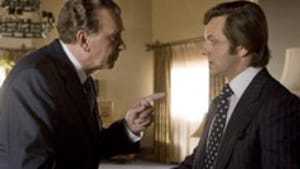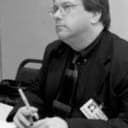Stay in the Loop
BSR publishes on a weekly schedule, with an email newsletter every Wednesday and Thursday morning. There’s no paywall, and subscribing is always free.
Frost/Nixon on DVD: The play vs. the movie vs. the real thing
"Frost/Nixon' on DVD

Depicting history in the movies is always a tricky proposition. Especially when the historical events being depicted are recent enough that at least some of the audience actually remember them. But even for the younger generation that was still riding in strollers or not even born when Richard Nixon was abusing executive power and the Constitution to a degree unequaled in American history (well, perhaps at least until the last administration), Watergate is a synonym for political scandal and skullduggery.
I'm somewhere in between, myself— old enough to remember Nixon, coming home from school to find my favorite afternoon TV shows pre-empted by something called the Senate Watergate Hearings, presided over by some really old guy who talked a little like Foghorn Leghorn. I knew the president had supposedly done some really bad things, and people were talking about kicking him out of office, something I didn't even realize was possible. But even at age 14, I knew that politics generally didn't make much sense anyway, even though I had only recently come to the realization that when the TV reporters talked about "guerrilla fighters," they didn't mean huge hairy apes cradling machine guns.
Snubbed by the Oscars
Ron Howard's Frost/Nixon might provide similar revelations for the younger folks to whom Watergate is only a trivia subject, while rewarding those of us who actually lived through it some fresh insights and perspective. Although it scored five Oscar nominations, it won none, and even during its theatrical run seemed to be rather unfairly overlooked and disregarded, overshadowed by the unexpected success of Slumdog Millionaire. Now, Frost/Nixon's recent DVD release eliminates any further excuse to ignore it.
It's the story of Nixon's 1977 TV interviews with David Frost, including both the wheeling and dealing that brought them about and the on-camera confrontation itself. But Howard has done more here than simply recreate one of the most intriguing footnotes to a seminal American political story. Even without the political context, Frost/Nixon works as a tale about two ambitious men confronting each other in search of redemption, absolution, worldly success and ultimate closure.
A director who grew up on TV
The film is also a subtle satire about the ability of the media, specifically TV, to both create and destroy careers, reputations and lives— told by a filmmaker who literally grew up on TV himself (on "Andy of Mayberry") and thus harbors an intimate knowledge of its power. The film shrewdly compares and contrasts the motivations and intentions of both its titular figures in seeking the interviews.
Frost, subtly and winningly portrayed by Michael Sheen, is a seasoned entertainment pro who yearns to be known for something more substantial than fawning interviews with pop stars, and who pushes for the Nixon encounter in a desperate bid to revive his flagging career. Nixon, masterfully evoked by Frank Langella, views the project both as a quick payday and as a convenient means to begin the process of his public rehabilitation and ultimately regain some of his lost power and influence— or so he hopes.
An unobtrusive filmmaker
As a director, Howard is more craftsman than auteur. His work isn't known for the artistic and stylistic unity and viewpoint of a Scorsese or Kubrick; you won't find film scholars discussing the distinctive "Howardian tracking shot" or editing style, for example. But his straightforward, unobtrusive approach to filmmaking lends itself remarkably well to the exploration of historical subjects, as he's done previously in Apollo 13 and A Beautiful Mind. (Whether the same approach works as well for more strictly fictional fare, such as Howard's current Angels and Demons, is a topic for another day.)
The disc includes the obligatory extras, such as a commentary by Howard, a making-of featurette, deleted scenes and, perhaps most intriguing, a comparison of clips from the actual Nixon interviews with their re-enactment in the film (for true political geeks, a complete set of the real interviews has also just been released on DVD). There's even a look at Nixon's Presidential Library that manages to be more even-handed and less ludicrous than one might imagine (the Library's executive director admits that the Nixon Foundation is "managed by people who really dig Nixon" but are "wise enough to understand this view is not universally shared").
Whether Richard M. Nixon is part of your living memory or just ancient history, Frost/Nixon provides a thoughtful and entertaining new perspective on this complex American figure.
I'm somewhere in between, myself— old enough to remember Nixon, coming home from school to find my favorite afternoon TV shows pre-empted by something called the Senate Watergate Hearings, presided over by some really old guy who talked a little like Foghorn Leghorn. I knew the president had supposedly done some really bad things, and people were talking about kicking him out of office, something I didn't even realize was possible. But even at age 14, I knew that politics generally didn't make much sense anyway, even though I had only recently come to the realization that when the TV reporters talked about "guerrilla fighters," they didn't mean huge hairy apes cradling machine guns.
Snubbed by the Oscars
Ron Howard's Frost/Nixon might provide similar revelations for the younger folks to whom Watergate is only a trivia subject, while rewarding those of us who actually lived through it some fresh insights and perspective. Although it scored five Oscar nominations, it won none, and even during its theatrical run seemed to be rather unfairly overlooked and disregarded, overshadowed by the unexpected success of Slumdog Millionaire. Now, Frost/Nixon's recent DVD release eliminates any further excuse to ignore it.
It's the story of Nixon's 1977 TV interviews with David Frost, including both the wheeling and dealing that brought them about and the on-camera confrontation itself. But Howard has done more here than simply recreate one of the most intriguing footnotes to a seminal American political story. Even without the political context, Frost/Nixon works as a tale about two ambitious men confronting each other in search of redemption, absolution, worldly success and ultimate closure.
A director who grew up on TV
The film is also a subtle satire about the ability of the media, specifically TV, to both create and destroy careers, reputations and lives— told by a filmmaker who literally grew up on TV himself (on "Andy of Mayberry") and thus harbors an intimate knowledge of its power. The film shrewdly compares and contrasts the motivations and intentions of both its titular figures in seeking the interviews.
Frost, subtly and winningly portrayed by Michael Sheen, is a seasoned entertainment pro who yearns to be known for something more substantial than fawning interviews with pop stars, and who pushes for the Nixon encounter in a desperate bid to revive his flagging career. Nixon, masterfully evoked by Frank Langella, views the project both as a quick payday and as a convenient means to begin the process of his public rehabilitation and ultimately regain some of his lost power and influence— or so he hopes.
An unobtrusive filmmaker
As a director, Howard is more craftsman than auteur. His work isn't known for the artistic and stylistic unity and viewpoint of a Scorsese or Kubrick; you won't find film scholars discussing the distinctive "Howardian tracking shot" or editing style, for example. But his straightforward, unobtrusive approach to filmmaking lends itself remarkably well to the exploration of historical subjects, as he's done previously in Apollo 13 and A Beautiful Mind. (Whether the same approach works as well for more strictly fictional fare, such as Howard's current Angels and Demons, is a topic for another day.)
The disc includes the obligatory extras, such as a commentary by Howard, a making-of featurette, deleted scenes and, perhaps most intriguing, a comparison of clips from the actual Nixon interviews with their re-enactment in the film (for true political geeks, a complete set of the real interviews has also just been released on DVD). There's even a look at Nixon's Presidential Library that manages to be more even-handed and less ludicrous than one might imagine (the Library's executive director admits that the Nixon Foundation is "managed by people who really dig Nixon" but are "wise enough to understand this view is not universally shared").
Whether Richard M. Nixon is part of your living memory or just ancient history, Frost/Nixon provides a thoughtful and entertaining new perspective on this complex American figure.
What, When, Where
Frost/Nixon. A film by Ron Howard. www.imdb.com/title/tt0870111.
Sign up for our newsletter
All of the week's new articles, all in one place. Sign up for the free weekly BSR newsletters, and don't miss a conversation.

 Mark Wolverton
Mark Wolverton